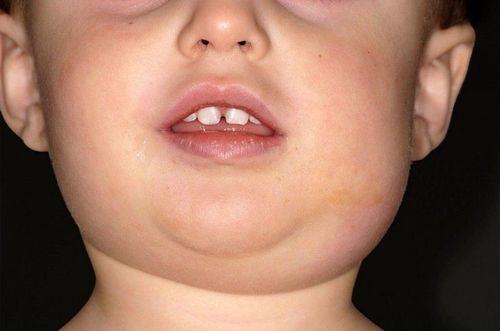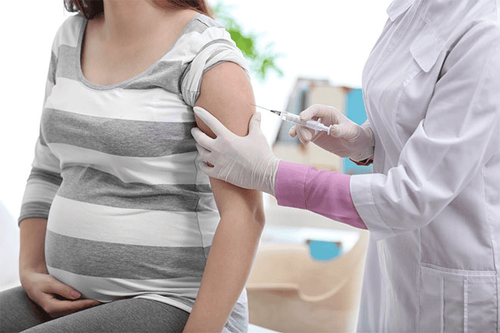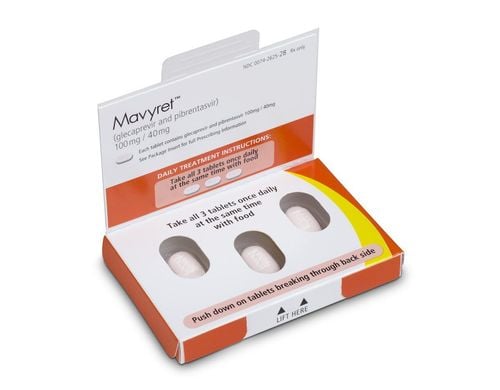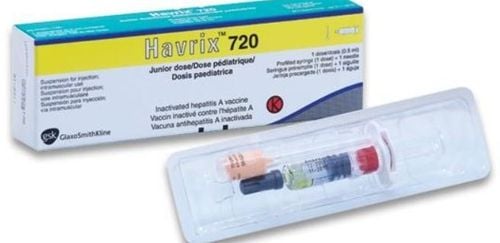This is an automatically translated article.
Vaccines are an effective way to proactively prevent disease, help children's body avoid disease or reduce symptoms of disease. Each age has a different vaccination schedule and the vaccinations for 5-year-olds are often less than in the previous period.
1. 5-year-olds need a flu shot
Children are very susceptible to influenza virus infection and are at risk of serious complications, even death, when sick. Influenza vaccination is indicated for children over 6 months of age and is given as booster shots each year. Because the immune response to a vaccine usually lasts for a year, and the flu virus changes every year, the vaccine is also refreshed to accommodate that variation.
Therefore, 5-year-old children also need a booster shot of the flu vaccine before the pandemic season to prevent flu or reduce symptoms.
2. Vaccines against diphtheria, whooping cough, tetanus
Children need to be vaccinated against diphtheria, whooping cough, tetanus is the answer to the question "what vaccine should a 5-year-old child get". Diphtheria and tetanus pertussis vaccine is a vaccine that helps the body to prevent diphtheria, pertussis, and tetanus for children, reducing the risk of serious illness if accidentally infected.
The time of vaccination is indicated for the first dose for children from 2 months old to less than 48 months old. Then, booster shots were given at 4 months old, 6 months old, 15-18 months old, 4-6 years old.
3. Hepatitis A vaccine is one of the vaccinations for 5-year-old children
Hepatitis A is caused by the hepatitis A virus that can be transmitted through the gastrointestinal tract. Young children are often susceptible to infection and attack by this virus.
Usually, the hepatitis A vaccination schedule is given to children with the first dose when they are over 12 months old and the booster dose is 6 to 18 months after the first dose.
If the child has not been vaccinated against hepatitis A or received the vaccine late, about 5 years old will be the time when the child starts the vaccination or booster shot.
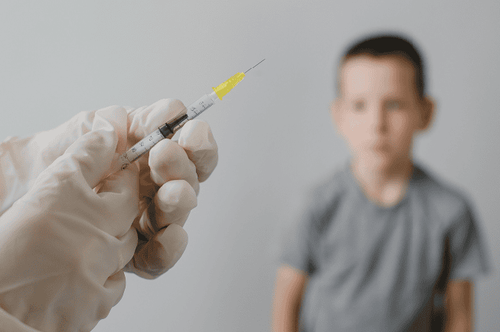
Các mũi tiêm phòng cho bé 5 tuổi thường ít hơn giai đoạn trước
4. Meningococcal vaccine
Meningococcal is a type of bacteria that can cause diseases in the respiratory tract, meningitis, bacteremia... very dangerous. The risk of complications and mortality is very high if infected.
There are many strains of meningococcal that can cause disease in humans, but in our country, there are strains that cause disease in humans including types A, B, C, Y and W-135. Therefore, children need to be vaccinated against meningococcal BC and Menactra vaccines against strains A, C, Y, W-135.
For 5-year-olds who have not been vaccinated against meningococcal disease, this is one of the vaccinations for 5-year-olds:
Meningococcal BC vaccine (VA-Mengoc-BC): Need to get enough 2 shots each 6 to 8 weeks apart. Vaccines against vaccines A, C, Y and W-135 (Menactra): A single dose is recommended for children aged 2 years and over to adults 55 years of age.
5. Japanese Encephalitis Vaccine
Japanese encephalitis is an acute infection caused by the Japanese encephalitis virus, transmitted by mosquitoes. This virus has the ability to damage the central nervous system, thereby causing severe brain damage, affecting the physical and intellectual development of children and even causing death. This is a disease that can affect people of all ages, but especially the high-risk group is children aged 2-6 years old.
For children 5 years old, it is also recommended to vaccinate or repeat to strengthen immunity. Currently on the market there are 2 types of Japanese encephalitis vaccines, including:
JEVAX vaccine: Schedule for the first injection for children over 1 year old, the 2nd dose after 1 to 2 weeks, the 3rd dose after the first dose. 1 year first. After that, it should be repeated once every 3 years. IMOJEV vaccine: The first dose is given to children over 1 year of age. Can be started at any time and the second dose is 1 year apart from the first. Thus, if a 5-year-old child has not been vaccinated with this vaccine, the first dose can be started at 5 years of age and repeated at 6 years of age.
6. Measles - Mumps - Rubella vaccine
Measles, mumps and rubella combined vaccine protects children against measles, mumps and rubella. Measles virus when contracted in young children can cause serious complications on the lungs, brain... . And Rubella is the cause of typhus in children, it is often dangerous for pregnant women.
According to the immunization schedule, children need the first dose at 12 to 15 months and a booster dose when they are 4 to 6 years old.

Vắc-xin phòng thủy đậu là một trong các mũi tiêm phòng cho bé 5 tuổi
7. Chickenpox vaccine
Chickenpox vaccine is one of the vaccinations for 5-year-old children. Chickenpox can be spread through the respiratory tract, for adults, chickenpox is quite benign, but for children it can cause many dangerous complications such as pneumonia, central nervous system damage, glomerulonephritis. acute...
To prevent the disease, it is necessary to administer the first dose of vaccine when the child is 1 year old and repeat when the child is 4 to 6 years old.
8. Vaccine against typhoid
Typhoid is a bacterial infection caused by the bacillus Salmonella typhi, which can be transmitted through the gastrointestinal tract, causing gastrointestinal infections, fever, infection and systemic toxicity...
Vaccine- Typhoid vaccine is indicated for the prevention of typhoid fever in adults and children over 2 years of age. The recommended vaccination schedule is 1st dose when children are 2 years of age or older and booster shots every 3 years.
In summary, vaccination is an important proactive disease prevention measure that helps children limit the risk of infectious diseases, reduce severe complications and the risk of hospitalization due to the disease. Children 5 years old usually do not need to receive too many vaccines if the child has been fully vaccinated in the previous period. Most shots given at age 5 are booster shots that help strengthen the child's immune system.
Bringing children to be fully vaccinated is a very necessary job for parents with young children. However, most parents are haunted by overcrowding, jostling, waiting too long at vaccination centers and procrastinating not to bring their children back for vaccinations on schedule, putting their children at risk. The risk of infection is high, especially in the peak seasons of the epidemic.
Vinmec International General Hospital system has long been the trusted address chosen by many families to vaccinate their children. The vaccination service of Vinmec International General Hospital has many outstanding advantages such as:
Fully meeting the demand for vaccines for all ages. Source of high quality vaccines, vaccines are strictly preserved in accordance with regulations. Professional, friendly and dedicated medical staff. The vaccination process strictly follows the regulations of the Ministry of Health: Before vaccination: Counseling for vaccination subjects, thorough screening to ensure normal health conditions and eligibility for vaccination. If the subject of vaccination is a child, counseling will be done with the child's father, mother or guardian. The doctors will advise and explain clearly, such as what injection the child needs, the use and benefits of the vaccine, the time of the booster shot... Thereby, parents can update more information and knowledge. vaccination for children. During vaccination: Administer the injection in accordance with regulations, ensure safety After vaccination: The vaccinated person will be monitored for at least 30 minutes after vaccination and the vaccinated family or subject will be instructed to continue Follow-up for at least 24 hours after vaccination.




